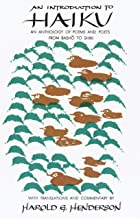An Introduction to Haiku: An Anthology of Poems and Poets from Basho to Shiki, Harold G. Henderson 1958
This is another one of those books, bought many years ago for $1 in a used book store (thanks to Jerry Cobb whoever and wherever he is who was the previous owner!), and schlepped from Cambridge to Vermont and back several times. Finally, I sat down and read it, a valuable experience in several ways. First, the explication of haiku’s derivation and history from 14th C. Japan to the present (or at least up to 60 years ago when,Henderson points out, there were 50 monthly magazines in Japan devoted to publishing haiku), was interesting and valuable for its insights into Japanese history and culture. Henderson, who was a professor at Columbia, acknowledges that ‘no two Japanese would quite agree on exactly what constitutes a haiku’, but defines it as “a very short poem with a traditional and classic form intended to express and to evoke emotion….the concentrated essence of pure poetry recording high moments….It depends for its effect on the power of suggesting a mood and providing a starting point for trains of thought and emotion….A good haiku is full of overtones and must be read many times in order to understand the traditional associations of weather, seasons, the natural world, social customs, and Buddhist beliefs.” Second, the literally hundreds of haiku (the author has decided to use the singular for the plural as well) beginning with those of the 17th C master, Matsuo Basho to the 19th C Masaoka Shiki make for wonderful reading. Henderson presents each haiku in the body of the text and matches it with a footnote giving the Japanese words in transliteration followed by the word by word English translation. While occasionally distracting on the page and not very useful for this naive reader, this matching of his translation with the original language gives a vivid sense of how difficult it is to translate these brief, condensed, powerfully emotional verses. There are probably many more readable and useful books on Japanese haiku, but this was great value for $1 and did provide hours of quiet reading and thinking.



